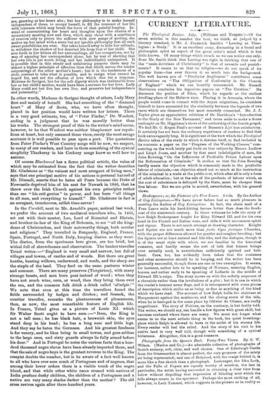CURRENT LITERATURE.
The Theological Review. July. (Williams and Norgate.)—Of the seven articles in this number the best, wo think, as judged by a literary standard, is Mr. J. Frederick Smith's " Leasing as Theo- logian : a Study." It is an excellent essay, discussing in a broad and philosophic spirit an aspect of the groat critic's mind which is but little known. Of many things which struck us wo can notice one only. Does Mr. Smith think that Lossiug was right in thinking that one of the "main doctrines of Christianity" is that of rewards and punish- ments? It seems to us that no religion—we do not speak of its popular form—has ever thrown it so much into the background. The well known pen of " Presbyter Anglicanus " contributes some observations on " The Obligations of Conformity in the Church of England" which wo can heartily recommend. Mr. Russell Martineau concludes his ingenious papers on "The Creation." He discusses the position of Eden, which ho regards as the earliest dwelling-place of the Hebrew race. Placing it in Armenia, whore the people would come in contact with the Aryan migrations, ho considers himself to have accounted for the similarity between the legends of two races which are themselves but most remotely connected. Mr. J. J. Taylor gives an appreciative criticism of Dr. Davidson's "Introduction to the Study of the New Testament," and turns aside to make a fierce onslaught on Mr. Higginson's views of the authorship of the fourth gospel. We find Mr. C. Kogan Paul's account of Bunsen's Life less satisfactory. It certainly has not been the ordinary experience of readers to find that book extravagantly long. It is significant of the view which the Theological Review takes of the study to which it devotes itself, to find included in its contents a paper on the " Progress of the Working Classes," com- menting on the work lately put forth on that subject by Messrs. Ludlow and Lloyd Jones, and another by that most indefatigable of men, Sir John Bowring, " On the Influences of Profitable Prison Labour upon the Reformation of Criminals." It strikes us that Sir John Bowring hardly meets the objection which is commonly made to the profitable labour of criminals,—an objection aimed not so much at the instruction of the criminal in a trade at the public cost, which after all is only a form of adult education ; but at the sale of the products of labour which, as the cost of subsistence is defrayed by the State, must be cheaper than free labour. But we are quite in accord, nevertheless, with his general views.






























 Previous page
Previous page